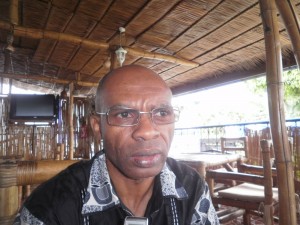Walter Wilson Nana
Buea, Cameroon
There is no stopping for the ongoing decentralisation process in Cameroon. The government of Cameroon, members of the Civil Society Organisations (CSOs), and funding partners in that domain like the European Union office in Cameroon have taken a commitment to see the process succeed and move on smoothly. At the Civil Society Strengthening Programme, PASC, of the Cameroon – European Union Cooperation, there is no time to waste. Emmanuel Njikam is a Senior Monitoring Officer at PASC and leading the training workshop for levels two and three CSOs in Buea, Southwest Region. At the
close of the workshop, which lasted November 18 – 20 2013, he granted this exclusive interview to iCameroon, where he talks about the necessity for leaders of CSOs to build bridges with mayors and council authorities for the betterment of their communities.
Excerpts:
What have you been telling the invited 30 members of CSOs at the Buea workshop?
We are sharing views with Civil Society leaders working in the domain of decentralisation. We are interested to enhance their capacity so that they can work smoothly with the municipal councils, give good advice to their respective mayors so that they can, in a collegiate manner build the local development.
How relevant is this capacity building workshop for CSO leaders?
The decentralisation process across the country offers many opportunities to work with the mayors. But members of CSOs do not have enough knowhow to move on. This explains why we in the Civil Society Strengthening Programme, known in the French acronym as PASC, in the Cameroon – European Union Cooperation have embarked on this nation-wide capacity building workshops to train and share ideas with levels two and three CSOs, who constitute the supporting actors in Cameroon’s decentralisation process.
How should the leaders of CSOs penetrate the sometimes difficult mayors and their administration to put forward their advice?
The members of CSOs must have the knowledge to give out. The mayors are at the receiving end. The mayors have a general knowledge on the decentralisation process but members of the CSOs must come in with fresh ideas and suggestions so that the mayors are better equipped on specific areas in the decentralisation process. The CSOs are coming in as reliable partners to the mayors.
Will PASC meet the mayors across the country to share these views and ideas with them also?
No! Our target is the CSOs. Not the councils and mayors. We are giving the CSOs tools and methods to go forward and work with the mayors. The way forward is to give more support to the CSOs so that they get going in their endeavours and successfully realise projects with their mayors.
Practically, how should the CSOs work with the mayors across the country?
To successfully build local development; you need more actors in the process, who will chip in their ideas and savoir-faire. Each stakeholder has a role to play. The CSO is the bridge between the community and the council. They have the responsibility to take the problems of the community to the council authorities and plan the solutions together. PASC thinks that if the CSOs are better trained and prepared, more development will ensue in our communities.
What is your assessment of Cameroon government’s ongoing project of decentralising the country?
The government has the responsibility to design the decentralisation framework and put in place the laws governing that sector. At the local level, all the stakeholders are expected to join in with all the living forces and take forward their local development. Our role as PASC is to build the capacity of the members of CSOs and make available some financial resources when the need arises, so that the knowledge and vision they have can come to fruition.
Any advice on how the government can better manage the country’s decentralisation process?
The government is doing a lot already. Let us not expect much from them. The laws are there already. The mayors have been elected and installations are ongoing. The tools for development are available. It is left for all of us to engage into the implementation phase. All of us in the communities, members of the CSOs, we must take our place and get going. We must play our role in the decentralisation process. This is not the time to lag behind.
At the close of the three-day training programme in Buea, what do you expect from the CSO leaders you have trained?
Our wish is to let them see, clearly, the role they can play in the decentralisation process and their partnership with the various councils. We also have some financial benefits for the CSOs so that they can come up with tangible projects, alongside the councils. Let them identify their roles, good projects they can run in the various council areas across the Southwest Region. That way, PASC would have attained its objectives.
What do you expect from the mayors when they are approached by members of the CSOs?
They have to be open and collaborate with the CSOs. The mayors, council authorities need the CSOs if they want to succeed in their mandate and quest for development. The mayors should not close their doors, that is my advice for them.
To Cameroonians, what are you telling them as the decentralisation train is on the rails?
I do not have a message to Cameroonians but to invite members of the CSOs to be nearer their communities, to work for the communities and not for themselves. Their role is to build that very important bridge between the community and the councils. The CSOs must go to the communities, understand their needs and wishes and take them up to the councils and in an open manner and solve problems with the support of the mayors.
Interviewed by Walter Wilson Nana




